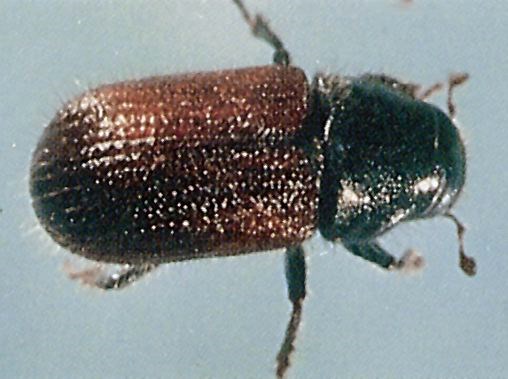The cold winter weather of the past while will potentially slow down northern B.C.'s tree beetle epidemics, but no death blow was dealt.
"Most bark beetles, including the mountain pine and fir beetles, will freeze to death between minus-33 and minus-35 degrees Celsius," said Dawn Makarowski on behalf of the Ministry of Forests, Lands, Natural Resource Operations & Rural Development.
"If the ambient temperature drops below minus-33 for a few days, widespread mortality will begin. Wind chill does not affect the beetles. The longer the cold period, the higher the mortality rate. Generally a mortality rate greater than 90 per cent is required to stop population growth. There is zero survival for beetles exposed to temperatures of minus-40 or lower."
The temperatures dipped to lows rarely seen in local February history, the past two weeks, but they still were inadequate to cause mass killing of the pests. According to Accuweather data, at no time did the mercury reach as low as minus-40, but Feb. 5 came close at minus-39. The dates of Feb. 2, 3, 5, 6, 7 and 9 registered temperatures of minus-29 to minus-34.
This will likely result in some mortality of the pine and fir beetles, but not a decisive eradication.
None of the cold snap is expected to affect the other killer bug afflicting local forests. The spruce beetle was not affected by the chill, said Makarowski, "because they tend to hibernate under the snow, preventing them from being exposed to extreme cold temperatures that would normally result in their death."
The pine and fir beetle, on the other hand, are sequestered above ground in the trees themselves.
However there is other good news on the spruce beetle front. Since 2015 this region has seen the largest outbreak of these pests it has ever experienced, but, said Makarowski, "monitoring data from the fall 2018 Aerial Overview Survey suggests there is reason for cautious optimism. The 2018 survey indicated that the severity of spruce beetle attacks in the Omineca has decreased and the number of impacted hectares has dropped from about 370,000 in 2017 to about 240,000 hectares in 2018."
Provincewide, said the survey, the number of affected hectares has dropped from about 500,000 to about 340,000.
"Due to the impacts of climate change (warmer and drier conditions) and the number of spruce trees in affected areas, the spruce beetle outbreak is still a significant concern for the forest industry in the Omineca and elsewhere in B.C.," Marakowski said. "Ministry staff have been working closely with First Nations, licensees and communities regarding: mitigation of the outbreak's impacts; effects on the mid-term timber supply; continued suppression of beetle populations; hauling and milling guidelines for salvaged timber; and the conservation of non-timber values."
More than $1.4-million was allocated in the ministry's 2017-18 Land Base Investment Strategy budget for spruce beetle detection and research. Another $1.4 million was allocated in 2018-19.



